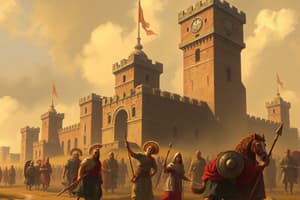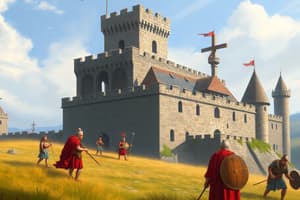Podcast
Questions and Answers
When did the Industrial Revolution begin in England?
When did the Industrial Revolution begin in England?
- Early 20th century
- Late 19th century
- Late 18th century (correct)
- Early 17th century
What impact did the two World Wars have on Britain?
What impact did the two World Wars have on Britain?
- Purely economic impact
- No impact
- Purely social impact
- Profound economic and social impact (correct)
What led to a period of re-evaluating Britain's place in the world?
What led to a period of re-evaluating Britain's place in the world?
- Economic prosperity from trade
- The rise of new colonies
- Increase in global power.
- Decline in global power and independence movements (correct)
What type of government does Britain have in the 21st century?
What type of government does Britain have in the 21st century?
What accompanied England's Industrial Revolution during the late 18th century?
What accompanied England's Industrial Revolution during the late 18th century?
What marked a significant societal shift in Neolithic settlements in Britain?
What marked a significant societal shift in Neolithic settlements in Britain?
Which of these options represent a lasting impact of the Roman period on Britain?
Which of these options represent a lasting impact of the Roman period on Britain?
What period saw the arrival of tribes that significantly altered the language and culture of Britain?
What period saw the arrival of tribes that significantly altered the language and culture of Britain?
Which event commenced in 1066 and significantly changed the course of English history?
Which event commenced in 1066 and significantly changed the course of English history?
What social and political system emerged as the dominant structure after the Norman Conquest?
What social and political system emerged as the dominant structure after the Norman Conquest?
During which era did England begin to compete for colonies and establish itself as a major naval power?
During which era did England begin to compete for colonies and establish itself as a major naval power?
What type of government was established in England after the Glorious Revolution?
What type of government was established in England after the Glorious Revolution?
Which century in British history was profoundly shaped by civil wars, the execution of a monarch, and the establishment of a republic?
Which century in British history was profoundly shaped by civil wars, the execution of a monarch, and the establishment of a republic?
Flashcards
Prehistoric Britain
Prehistoric Britain
Period marked by early human settlements and societal shifts from hunter-gatherers to farming communities.
Roman Britain
Roman Britain
Era following the Roman conquest in the 1st century CE, notable for Roman law, infrastructure, and cultural influence.
Anglo-Saxon period
Anglo-Saxon period
Time when Anglo-Saxon tribes arrived, leading to the establishment of kingdoms, language changes, and cultural shifts.
Viking impact
Viking impact
Signup and view all the flashcards
Norman Conquest
Norman Conquest
Signup and view all the flashcards
Hundred Years' War
Hundred Years' War
Signup and view all the flashcards
Renaissance in England
Renaissance in England
Signup and view all the flashcards
Glorious Revolution
Glorious Revolution
Signup and view all the flashcards
Industrial Revolution
Industrial Revolution
Signup and view all the flashcards
Colonial Expansion
Colonial Expansion
Signup and view all the flashcards
Impact of World Wars
Impact of World Wars
Signup and view all the flashcards
Decline of Empire
Decline of Empire
Signup and view all the flashcards
Modern Constitutional Monarchy
Modern Constitutional Monarchy
Signup and view all the flashcards
Study Notes
Prehistoric Britain
- Archaeological evidence shows humans in Britain during the late Pleistocene epoch, indicating early migrations.
- Neolithic settlements emerged with farming, changing social structures.
- Bronze Age and Iron Age cultures followed, showing advancements in metalworking and social organization.
Roman Britain
- The Roman conquest (1st century CE) significantly impacted Britain's development.
- Roman forces established military and administrative systems, introducing Roman law and infrastructure.
- Roman influence on language, culture, and architecture remains present today.
- The Roman withdrawal (5th century) left Britain vulnerable to invasions and conflict.
Anglo-Saxon and Viking Periods
- Anglo-Saxon tribes (5th-6th centuries) caused major shifts in language and culture.
- Various kingdoms formed, eventually uniting under a single ruler.
- Viking raids and settlement resulted in cultural blending and political changes.
Medieval England
- The Norman Conquest (1066), led by William the Conqueror, marked a new era.
- Feudalism became the dominant social and political system.
- English common law and parliamentary institutions developed, forming the groundwork for the future.
- Conflicts like the Hundred Years' War reshaped Britain's political landscape.
- The Black Death severely impacted social and economic structures across Europe, including Britain.
The Renaissance and Early Modern Period
- The Renaissance saw a flourishing of arts, science, exploration, and trade.
- Religious reformation challenged traditional religious structures.
- England became a powerful naval force, competing for colonies and trade routes.
17th and 18th Centuries
- Civil wars, the execution of a monarch, and the establishment of a republic shaped the 17th century.
- The Glorious Revolution established a constitutional monarchy.
- England's industrial revolution (late 18th century) transformed its economy and society.
- Colonial expansion brought wealth and conflict.
19th and 20th Centuries
- Britain's global power encompassed much of the world, influencing trade, politics, and culture.
- The two world wars deeply affected Britain economically and socially.
- The decline of Britain's global power and independence movements within the British Empire spurred a reassessment of its role in the world.
- Modern political and social issues (industrialization, voting rights, social reform) developed over centuries.
21st Century
- Britain, transitioning from the British Empire to its present form, became a prominent international member.
- Ongoing social, economic, and political developments continue to shape the nation.
- Recent events and their effects on Britain's international relationships are being studied.
Studying That Suits You
Use AI to generate personalized quizzes and flashcards to suit your learning preferences.




